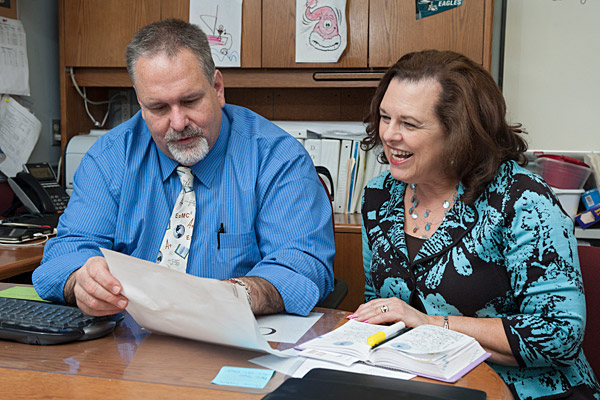
Professional development
UD center offers 'superheroes' to assist southern Delaware schools
11:56 a.m., April 30, 2012--“What we want to do is clear the slate and create something new,” Edward Emmett explained in the fall of 2010.
As director of Dover’s Positive Outcomes Charter School, he was speaking to Tracy Hudson, coordinator and literacy specialist of UD’s Southern Delaware Professional Development Center (SDPDC), and his request was a bold one.
People Stories
'Resilience Engineering'
Reviresco June run
Could her organization work with the small, 7-12th grade charter school to create a brand new curriculum—one that would be fully aligned with state standards, support teachers and students, and integrate new learning-focused methodology?
“Well,” Hudson replied. “I don’t know if it fits into our 28-day contract.”
In fact, it didn’t.
Now, as part of a three-year contract, the SDPDC is not just creating a new curriculum for the school, it’s developing a system that has never been done before.
About the SDPDC
Of the 19 school districts in the state, the Southern Delaware Professional Development Center provides nine districts in Kent and Sussex counties and one charter school in Dover with professional development in teaching-specific content areas.
This covers everything from coaching teachers on writing lesson plans, to implementing “learning-focused strategies” (a research model for closing achievement gaps and increasing student learning), to developing and coding school-administered tests that assess student performance.
In every instance, SDPDC specialists begin with baseline walkthroughs in the school to gain a firsthand account of strengths and weaknesses, and continue to engage with teachers and principals on what areas they would like to enhance.
“What we’re doing is targeted professional development,” said Timothy Young, a secondary social studies teaching specialist for SDPDC.
And in no school is this more clearly evidenced than Positive Outcomes, where 70 percent of the students are eligible to receive special education services and more than 90 percent have failed in traditional school environments.
Aligning with state standards
Emmett’s request to SDPDC to “develop something with us, for us” stemmed from the school’s own inventory of its strengths and weaknesses.
“We felt like we were doing a lot of things right, but we really needed to beef up our curriculum,” said Principal Steven Norman.
Throughout Delaware, curriculum development has always been done at the local level, and 2012-13 marks a crucial time for schools, as the state transitions from the Delaware Prioritized Curriculum to the Common Core State Standards, a national initiative to bring diverse state curricula into alignment with each other.
For the SDPDC, this curricular move statewide made the task at Positive Outcomes even greater.
“The new standards are much higher in rigor,” explained Hudson.
Reading passages on state tests that were previously used in 10th grade, for instance, will now be tested in grade 9.
SDPDC has therefore spent this past year training teachers, and already the Camden charter school has seen some tremendous growth.
During winter math and reading DCAS—the Delaware Comprehensive Assessment System, an adaptive state test to measure student achievement—the Positive Outcomes Charter School doubled the growth that the state has been averaging.
“We’re a success story in the making,” said Norman. “We’re not done.”
Nor is the Southern Delaware Professional Development Center, which views the 2012-13 school year as a “monitoring year” to ensure the curricular changes and new teaching strategies are in full effect.
Beyond the curriculum
Emmett, the school’s director, compares Hudson and the four other teaching specialists at SDPDC to “superheroes.”
“Nobody in the state could do the work they’ve been doing,” he said. “The biggest thing they’ve brought is not just the new curriculum, but the improvements to instructional practice.”
Indeed, each of the five teaching specialists in the SDPDC is heavily involved in direct onsite teacher coaching and mentorship, and nearly all make weekly walkthroughs in the school to ensure that learning-focused strategies are being implemented in the classroom.
“You can do all the professional development you want,” said Hudson, “but if it’s not translated into teacher practice, which impacts student learning, then nothing is going to change.”
What makes the SDPDC so unique is that its specialists—all of whom are former teachers, most with 20-plus years experience teaching in Southern Delaware schools—are contracted for extended periods of time.
“We know the state, we know the teachers, and we stay in the schools,” Hudson said. “Sometimes when you have teacher training, the trainers come and leave. We don’t. We’re here training our teachers and staying to support them.”
Article by Artika Rangan Casini
Photo by Evan Krape








